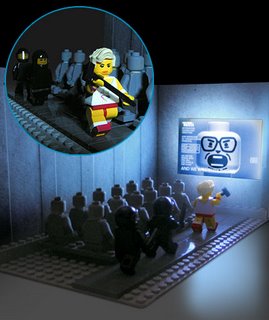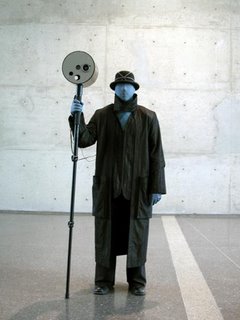The six words are at the end of this post. Before I get there, some musings that will make no sense at all if you haven't read the comics in question.
On first reading
Seven Soldiers #1 my immediate reaction was mild disappointment. The promotional copy leading up to this denouement had been pretty specific about what to expect. The seven lead characters were all coming at the threat of the Sheeda from different directions and held different pieces of the puzzle, which might have something to do with the
seven imperishable treasures; two of the seven would cross paths; one would betray the others; and one, as every issue reminded us until we were sick of hearing it, would die.
The issue delivered each of those plot points as promised. (With the slight fudge that while only two of the seven met per se, we also saw one of the remaining soldiers, Bulleteer, walk right past the Manhattan Guardian...though they didn't
meet..) We got the betrayal and the death from the most logical candidates for each. Can something count as a surprise if you believed it was too obvious a choice and expected the author to surprise you with another choice, but he didn't? That death turned out to be pretty anticlimactic. And one of the seven lead characters disappears more or less between panels; we never find out what ultimately happens to him.
Beyond that, the supposed "main event" -- the attempted Harrowing of modern civilization by the time-traveling Sheeda -- seemed to be treated as merely a background to the stories of the lead characters. The Sheeda were much more vivid and in focus when they were introduced in Morrison's preliminary three-part story for
JLA Classified. Here at their big finish, they were just sort of...around. No armies of normal humans turned to zombies by Sheeda spine-riders, nothing to rival the subversion of the Ultramarines in that earlier story. They might as well have been a swarm of mosquitoes.
The whole thing was elegantly written -- structurally, it leaves
Watchmen in the dust, and it's about time -- but on the surface it delivered only what was expected in terms of plot mechanics, and I was hoping for something
more. Something that would stun me and make me look at everything which preceded it in a different light. Not something that merely fulfilled my expectations...
...But then there was that crossword puzzle. At first glance it looks like a simple joke, along with the scene between Carla and her mom rendered as a newspaper gag strip. But there was this:
ACROSS 1 - One of dead Suzi's twins, hidden in the whole name at Guardian HeightsThe answer is "Lena" -- literally hidden in the "who
le name" but also hidden at Guardian Heights, where Lena works with her twin brother Lars as gun-toting assistants to Ed Stargard, formerly Baby Brain of the Newsboys of Nowhere Street. There was nothing in the
Guardian miniseries suggesting that Lena was anything more than a minor supporting character, certainly nothing to indicate she was another supporting character's daughter. But it had to have been mentioned here for a reason. More than merely being mentioned, it was hidden in a crossword clue...and hiding something is a way of saying it's important.
So Lena and Lars were the twins born to Chop Suzi before she died in childbirth. The other Newsboys blamed poor Captain 7 for her death -- he would be guilty of statutory rape, an 18 year old boy having sex with a 14 year old girl -- and they beat him into Ali Ka Zoom's magic cabinet, never to be seen again. But as Cameron Stewart, the artist on the
Guardian miniseries, pointed out
here...there's something odd about that. Lars and Lena are blond and blue-eyed Nordic types; certainly not the children you'd expect from the pairing of Suzi with the African-American Captain 7. Whatever else Captain 7 did or didn't do, he did not impregnate Suzi. Ed, the Baby Brain, knows this all too well. He takes in Suzi's twins and shelters them...and as adults they care for their father in his old age.
(Yeah,
ick, right?)
And since this was hidden, and must be of some import to be mentioned at all, it made me start teasing out what else might be going on here.
Here's my best guess: Morrison writes in the
Zatanna miniseries about the essential role of misdirection in magic. What if that's the best description of
Seven Soldiers itself? What if the story that's supposedly being told -- seven superheroes versus time-traveling evil fairies, with its preordained, almost mechanistic conclusion -- is itself sleight-of-hand to conceal the actual story he's telling beneath the surface?
Who's really to blame for the murder of Captain 7? Zor, the Terrible Time Tailor, who weaves ugly destinies and forces children to wear them. Suzi was already pregnant when the Newsboys went to the old Gold place in Slaughter Swamp, looking for an explanation to the Sheeda mystery many years ago...but Zor created her tragic fate.
The whole series is full of bad or absent parental figures. Melmoth is the literal father of Misty, the blood progenitor of Frankenstein, and the father of Klarion's whole race. Glorianna is a wicked stepmother to Misty and corrupts knights to serve her. Klarion is betrayed by his long-lost runaway father. Sally Sonic is driven mad by her mistreatment at the hands of Vitaman, an older man who exploits her. Alix Harrower is the descendant of Auracles, driven mad by captivity. Auracles is a human son of absent Gods, and a vanished god to the people of Limbo Town. Shiloh Norman is scarred by the loss of his older brother, a parental surrogate and authority figure. Jake Jordan's father-in-law, a good parent, is killed. Zatanna seeks her lost good father, Zatara, while Zor impersonates him and literally tries to make her his evil daughter.
There are bad children as well. The people of Limbo Town raise up their dead fathers to serve them as unliving Grundy-Men. Klarion is amoral at best, and falls in with the exploited Billy Beezer and the Deviants. Nepton gets back at his overbearing mermaid mother Suli Stellamaris. Sally Sonic is meant to be a Lolita-esque seductress (though the art in
Bulleteer obscures that). Frankenstein meets Uglyhead, a boy who works with the Sheeda. The Sheeda themselves are the ultimate bad children: they're our degenerate heirs, reduced to periodically looting the riches we create and unable to make any wealth of their own.
Good adults (such as Giovanni Zatara, Larry Marcus, Aaron Norman, even Metron) nurture and guide the young, creating heroes. Bad adults (such as Zor, Melmoth, Gloriana, Ebeneezer Badde, Vitaman) use and exploit the young, creating villains.
So maybe all this stuff about time-traveling evil fairies at the end of the world was a ruse. The real story is about child victims of psychological abuse by a bad adult manipulating people and events to bring down their abuser. The wronged children, grown to be neurotic and guilt-ridden adults, finally redeem themselves for their past crime of killing one of their own.
And when Zor faces his final punishment, it comes in the form of being made into a simulacrum of the miser Cyrus Gold -- significantly described as an old pervert who murdered some children -- and being sent out to face a 19th Century lynch mob in Gold's place. (Even that won't be the end of it: Zor-as-Gold is fated to rise up from Slaughter Swamp as the undead Solomon Grundy...)
Adults have the power to do terrible things to the innocence of childhood -- not to put
too fine a point on it, perhaps even in the way adults use or misuse the fairy tales and comic book characters of childhood -- but sometimes the memory of childhood idealism has enough power to fight back and win in the end. Morrison never puts this into the foreground, but I think that's what the real story was. Or, to condense all of the above into six words:
"Adults mess children up: favor returned."
 ...and whore myself out for nearly every social networking site dangled in front of me, you can find me on ComicSpace. That photo is nearly a year old and doesn't really look like me anymore...but it was one of the less repellent ones I had available. Really seems like it cries out for a funny caption, though. Like "RAB tries to induce a moment of psychic nosebleed zen in himself by sheer concentration." Or "RAB enters the Zach Galifianakis lookalike contest." Or "Step away from the Interrositer, Doctor Meacham." Please feel free to suggest more captions in the comments section.
...and whore myself out for nearly every social networking site dangled in front of me, you can find me on ComicSpace. That photo is nearly a year old and doesn't really look like me anymore...but it was one of the less repellent ones I had available. Really seems like it cries out for a funny caption, though. Like "RAB tries to induce a moment of psychic nosebleed zen in himself by sheer concentration." Or "RAB enters the Zach Galifianakis lookalike contest." Or "Step away from the Interrositer, Doctor Meacham." Please feel free to suggest more captions in the comments section.













